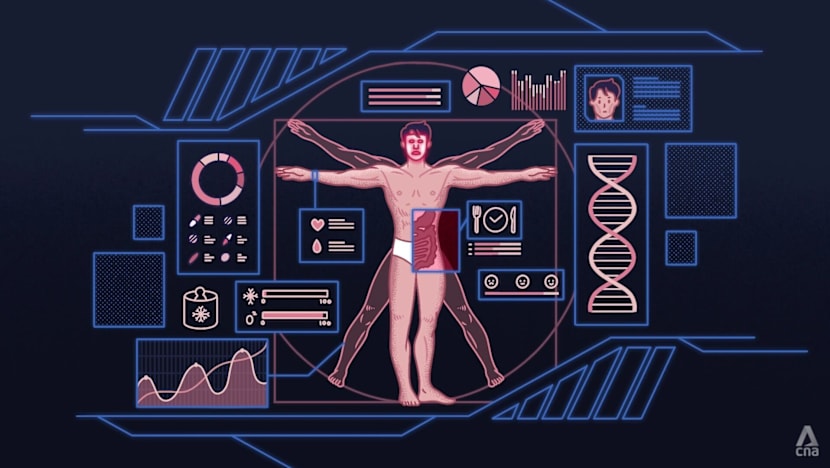Health
Biohacking Revolution: Individuals Aim to Redefine Longevity

A growing number of individuals are adopting biohacking practices in an attempt to redefine human longevity and enhance overall well-being. Among them is 43-year-old entrepreneur Nicholas Lin, who meticulously follows a daily regimen that includes seven hours of sleep, a carefully curated stack of 34 supplements, and a diet rich in protein. Lin’s approach to health is not merely a routine; it is a detailed protocol designed to optimize his physical and mental performance, inspired by a desire to feel as fit in his 40s as he did in his 20s.
Lin, who logs every aspect of his regimen in a ten-page document, consumes between 2,050 to 2,250 calories daily, incorporating a range of protein sources including grass-fed beef and eggs. He engages in a low-impact strength and conditioning workout each evening and spends an hour daily in a self-described “anti-aging room.” This space is outfitted with advanced equipment like red light panels and an oxygen concentrator, which he believes contribute to cellular rejuvenation and overall health.
Driven by a similar quest for optimal health is Vignesa Moorthy, 52, whose journey into biohacking began following his mother’s cancer diagnosis in 2019. As the CEO of cybersecurity firm Vieqwest, Moorthy has radically transformed his lifestyle by eliminating alcohol and cigarettes and prioritizing sleep and exercise. He undertakes a three- to four-day water fast each month and has invested approximately S$50,000 (about US$38,500) annually on biohacking treatments and monitoring.
Both Lin and Moorthy are part of a larger biohacking movement that combines lifestyle changes with technology to improve health and extend lifespan. For many, this includes experimenting with various interventions, from dietary adjustments to advanced therapies like red light and hyperbaric oxygen treatments.
The Science Behind Biohacking
At the forefront of this movement is Professor Dean Ho, director of the Institute for Digital Medicine at the National University of Singapore. Ho began his biohacking journey with a simple blood testing kit and has since engaged in a detailed exploration of his metabolic health. He tracks his biomarkers multiple times a day and has undergone numerous trials to refine his approach to health optimization.
Ho is currently the sole test subject in a study called “Delta,” which aims to understand individual health trajectories through data-driven methods. He has observed significant improvements in his metabolic performance, claiming that his insulin sensitivity rivals that of much younger individuals. This data-driven approach underlines the potential of biohacking to provide personalized health insights, an aspect that resonates with many in the community.
The biohacking community embraces a variety of methods, ranging from lifestyle tweaks like intermittent fasting to the adoption of advanced scientific treatments. While some individuals focus on traditional health principles, others explore more experimental approaches, blending rigorous data analysis with personal health intervention.
The Risks of Unregulated Experimentation
Despite the promising potential of biohacking, experts caution against unregulated experimentation. According to Dr. Laureen Wang, head of the Healthy Longevity Research Clinic at Alexandra Hospital, many biohacking practices lack robust scientific evidence. She warns that while the intent to optimize health is commendable, it often involves unproven therapies that could be harmful.
In light of this, medical professionals emphasize the importance of a balanced approach to health and longevity. Dr. Wang advocates for foundational lifestyle practices, such as maintaining a balanced diet and regular physical activity, as the most effective means of promoting health. These principles have been endorsed by various studies highlighting the benefits of strong social connections and preventive healthcare.
Entrepreneurs like Lin and Moorthy reflect a growing trend among affluent individuals who are eager to take control of their health through biohacking. However, experts remind consumers to remain cautious, particularly regarding the promises made by clinics offering expensive treatments that may not have undergone rigorous testing.
In conclusion, the quest for improved health and longevity through biohacking is a multifaceted movement that blends personal experimentation with scientific inquiry. As more individuals join this community, the need for ethical oversight and evidence-based practices becomes increasingly important. Biohacking offers exciting possibilities but must be approached with care to ensure safety and effectiveness.
-

 World5 months ago
World5 months agoSouth Korea’s Foreign Minister Cho Hyun to Visit China This Week
-

 Business5 months ago
Business5 months agoStarling Bank Plans Secondary Share Sale, Targeting $5.4 Billion Valuation
-

 Top Stories5 months ago
Top Stories5 months agoMunsang College Celebrates 100 Years with Grand Ceremony
-

 World5 months ago
World5 months agoPAS Aims to Expand Parliamentary Influence in Upcoming Election
-

 Business7 months ago
Business7 months agoKenvue Dismisses CEO Thibaut Mongon as Strategic Review Advances
-

 Lifestyle6 months ago
Lifestyle6 months agoHumanism Camp Engages 250 Youths in Summer Fest 2025
-

 Sports6 months ago
Sports6 months agoDe Minaur Triumphs at Washington Open After Thrilling Comeback
-

 Sports7 months ago
Sports7 months agoTupou and Daugunu Join First Nations Squad for Lions Clash
-

 Top Stories7 months ago
Top Stories7 months agoColombian Senator Miguel Uribe Shows Signs of Recovery After Attack
-

 World7 months ago
World7 months agoASEAN Gears Up for Historic Joint Meeting of Foreign and Economic Ministers
-

 Health6 months ago
Health6 months agoNew Study Challenges Assumptions About Aging and Inflammation
-

 Business7 months ago
Business7 months agoOil Prices Surge Following New EU Sanctions on Russia









